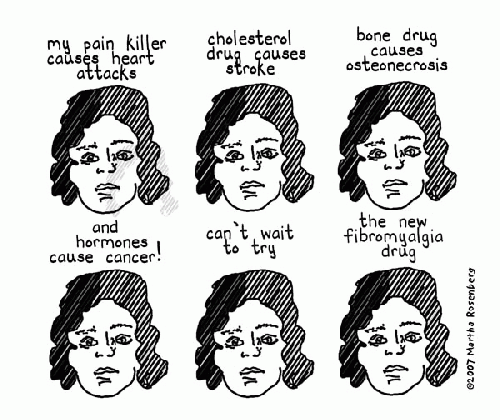(Article changed on March 4, 2013 at 12:39)
Recently some of the nation's top researchers, clinicians
and scientists convened in Washington D.C. for the first annual Selling Sickness conference--examining
how Pharma "sells" diseases to move the medications intended to treat
them.
Examples of Pharma's disease-mongering business model abound, especially since direct-to-consumer advertising began in the late 1990's. Depression, bipolar disorder, seasonal allergies, insomnia and gastro reflux disease (GERD) are just some of the "diseases" that tripled and quadrupled in the population thanks to TV advertising, sometimes accompanied by self-administered "quizzes." Even more lucrative have been childhood and adult ADHD, assorted behavioral, mood and "spectrum" disorders, excessive sleepiness and "wakefulness" disorders and of course restless legs syndrome. Ka-ching.
Proof of Pharma's disease-selling model is as close as
investment reports which unabashedly gush about growing "markets" for
fibromyalgia or depression. And 2013 reveals that a "market" for ankylosing
spondylitis is unfolding now that Abbott has dedicated an entire company to
sell its extreme drug Humira.
Do you have back pain? Are you dismissing it as resulting from "lifting too much" at the gym or "bad posture" ask Abbott radio ads. You might have ankylosing spondylitis . Instead of spending five dollars a month on aspirin or acetaminophen, you could be spending $20,000 a year on Humira and exposing yourself to tuberculosis (TB) and serious viruses, fungi, or bacterial infection!
Why would people voluntarily take a drug that "may increase the chance of getting lymphoma, including a rare kind, or other cancers" hepatitis B infection in carriers of the virus, allergic reactions, nervous system problems, blood problems, heart failure, certain immune reactions including a lupus-like syndrome, liver problems, and new or worsening psoriasis"? Side effects that are worse than the conditions being treated? ("Some people have died from these infections," says the label) Because advertising works!
ADHD has been another lucrative disease for Pharma, though marketers worry about the five million kids at risk of going off their ADHD meds when they leave home. "I remember being the kid with ADHD. Truth is, I still have it," said an ad from stimulant maker Shire with a photo of Adam Levine, the lead singer of Maroon 5, in the Northwestern University student newspaper, the Daily Northwestern. "It's Your ADHD. Own It," is the tagline. (Was "Stay Sick" the second choice?)
This week, a widely disseminated press release furthers the
ADHD financial damage control by announcing research that reveals that "ADHD
Can Often Persist Into Adulthood." News outlets obediently headlined their
articles "ADHD Doesn't Go Away," and "ADHD Can Often Persist
Into Adulthood" (gee, thanks!) without even noting the financial
partnership between Shire and the study's lead organization, Boston
Children's Hospital, penned just four months ago. Oops.
(Note: You can view every article as one long page if you sign up as an Advocate Member, or higher).






